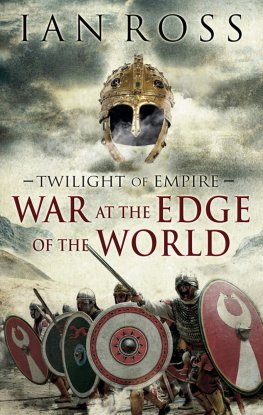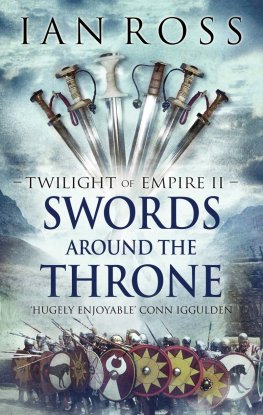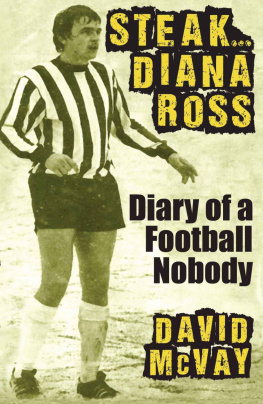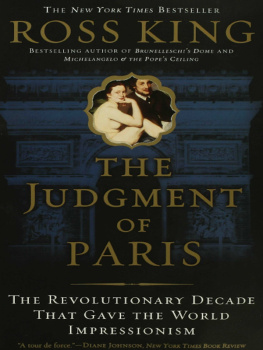Ian Ross - The War at the Edge of the World
Here you can read online Ian Ross - The War at the Edge of the World full text of the book (entire story) in english for free. Download pdf and epub, get meaning, cover and reviews about this ebook. year: 0101, publisher: Head of Zeus, genre: Adventure. Description of the work, (preface) as well as reviews are available. Best literature library LitArk.com created for fans of good reading and offers a wide selection of genres:
Romance novel
Science fiction
Adventure
Detective
Science
History
Home and family
Prose
Art
Politics
Computer
Non-fiction
Religion
Business
Children
Humor
Choose a favorite category and find really read worthwhile books. Enjoy immersion in the world of imagination, feel the emotions of the characters or learn something new for yourself, make an fascinating discovery.
The War at the Edge of the World: summary, description and annotation
We offer to read an annotation, description, summary or preface (depends on what the author of the book "The War at the Edge of the World" wrote himself). If you haven't found the necessary information about the book — write in the comments, we will try to find it.
The War at the Edge of the World — read online for free the complete book (whole text) full work
Below is the text of the book, divided by pages. System saving the place of the last page read, allows you to conveniently read the book "The War at the Edge of the World" online for free, without having to search again every time where you left off. Put a bookmark, and you can go to the page where you finished reading at any time.
Font size:
Interval:
Bookmark:
Ian Ross
The War at the Edge of the World
Di boni, quid hoc est quod semper ex aliquo supremo fine mundi nova deum numina universo orbi colenda descendunt?
Gracious Gods! Why is it that new deities, destined to be universally revered, always descend from some most distant edge of the world?
Panegyrici Latini VIPrologue
Oxsa, Central Armenia, June AD 298
The army assembled before dawn. All night the legionaries had marched through dry ravines and across rocky slopes, stumbling in the darkness with muffled weapons, forbidden to make a sound as they flanked the enemy position. Now, as the first rays of sun lit the snows of the high mountain ranges, they saw the royal encampment of the King of Persia in the brown valley below them, with their enemies spilling from the gates in confusion. Already in their hearts was the promise of a battle won.
Twenty-five thousand men formed a battle line over a mile long. Massed squadrons of cavalry held the higher ground at the flanks: mailed Sarmatian lancers; Dalmatian light horsemen; mounted archers from Armenia and Osrhoene. Between them stood five thousand allied Gothic tribesmen in full barbaric array, fierce warriors from beyond the empires northern boundaries. But at the centre of the line were ten thousand armoured infantrymen drawn from the crack legions of the Danube frontier. As the sun rose, the light gleamed off helmets of burnished iron and bronze, hauberks of mail and scale, the bristling tips of spears and javelins and the serried lines of oval shields. The sky-blue shields of Legion I Jovia bore the eagle and thunderbolt of Jupiter; beside them, the blood-red shields of II Herculia were emblazoned with the naked figure of Hercules with his club and lion-skin. To either side were the black shields of I Italica, the sea-green of XI Claudia, the white of V Macedonica and the tawny-yellow of IV Flavia.
Six months ago these men had left their garrison fortresses in Moesia and Scythia and marched southwards through Thrace and across the Bosphorus into Asia. At Satala on the upper Euphrates, they had been mustered by the Caesar Galerius, Commander of the East, before crossing the border into Persian-occupied Armenia. Through high mountain passes still bright with snow they had descended to the Armenian uplands, to face the expeditionary force of Narses, Great King of Persia.
And now the enemy was before them, shimmering in the dawn sun-haze. Impossible to guess the number of their host: forty thousand, or maybe twice that. The light caught the flash of their coloured banners, the heavy dazzle of their armoured horses.
In the Roman ranks, men shifted and spat as the sun mounted and the morning grew hot. The legionaries passed waterskins along the lines, tipping back their heads and swigging the cool liquid, letting it spill over their faces and down their necks. The front line was four men deep, spears and javelins readied behind locked shields. Behind them, the reserve cohorts formed another four-deep line, and in between were the tribunes and the standards, long funnels of purple and red silk streaming from the heads of gilded dragons. Dust fogged the air. The soldiers tasted it in their mouths; it gritted between their teeth. Sweat slicked their faces and poured down their bodies beneath the hug of their armour.
Back in the reserve lines, a bull-necked young soldier of II Herculia unlaced his helmet and pulled the hot iron from his head, scrubbing a palm through the short yellow stubble of his scalp. Sweat prickled between his fingers, and he blinked in the glare. A couple of his comrades were following his lead.
Helmets on, the centurion growled. He nodded away to the right. Along the front lines of I Jovia, a big man was approaching on a capering white horse, its trappings gleaming with gemstones. The soldier replaced his helmet and tied the laces beneath his jaw.
A sudden wave of cheering came from the ranks of the Joviani, the legionaries throwing up their hands and clashing their spears against their shields. The man on the white horse returned their salute. From down the line, the men of II Herculia could see him clearly now his heavy red face and cropped black beard, his massive frame in a gilded breastplate, the purple cloak streaming behind him. Galerius, Caesar of the East. Their commander.
The emperor rode closer, the standards dipping as he passed. Behind him rode his senior tribunes and his mounted bodyguard; every man in the cohort tensed and craned forward, trying to catch the words of the address.
Herculiani! the emperor called, his horse backing and kicking dust, down there in the valley you see the last enemies of the Roman race! His voice was high and straining, strange from such a big man, but thin and metallic, each word like worked brass. They think, these Persian slaves, that theyve already defeated the flower of the Roman army! But it was only a small force that they met a year ago, from the eastern legions. Now, my brothers, they have you to contend with Danubians! Herculiani!
A massed shout from the ranks, the beginning of a chant, Rome and Hercules, Rome and Hercules The soldiers shoved together, jostling, eager.
Galerius threw up his palm for silence. His voice cracked and snarled as he yelled to them. Weve disturbed the Great Kings breakfast!
Laughter from the troops, a rattle of spearshafts against shield rims.
Now now this pack of yelping Babylonian dogs are coming up here to demand an apology!
The laughter doubled, the clatter grew louder.
Are you going to give them what they want?
NO! A shout from massed throats.
Are you going to send them crying back to their kennels?
YES! Rome and Hercules, Rome and Hercules
When they come against us, brothers, remember you are men of the Danube! This scum of the Euphrates cannot stand up to you! Remember you are men of Hercules! Here on this hillside, brothers, we build the walls of Rome. Unbreakable!
The chant grew to a wild cheer, a percussive tumult, men flinging up their hands in salute. The emperor turned on his horse, waving to right and left as his purple standard snapped above him, then urged his mount forward again.
Once more the quiet returned, the dust settling as the officers ordered their men back into formation. Clack and rattle of spear and shield, javelin and dart. The young soldier had seen the lie of the land as they had deployed: the slope dropped beneath them to a narrow stream, and then rose on the far side to the Persian camp. It was a good position the momentum of the enemy charge would be broken as they crossed the stream, and then they had the slope ahead of them. All the Roman infantry had to do was stand their ground: against their solid anvil the swinging hammers of the allied cavalry would break the army of Persia.
Now the troops could hear the strange music from the enemy camp, the high metal screaming of Persian trumpets, the rattle and throb of drums so alien and unmanly to the Roman ear. Through the glare and dust they could see the banners racing forward and back as the mass of the enemy poured from their camp and assembled in battle formation. Heavy in leg and stomach, the soldiers waited in the sweating light.
Steady, steady, the centurion said. His face was impassive, sunburnt. Behind him, the big youth with the yellow hair stared into the middle distance, through the ranks of the forward cohorts and across the valley at the force gathering against them. He had served five years already in the legions, but this would be his first experience of pitched battle. The temptation to advance was strong to close the distance with the enemy, bring things to a conclusion. To remain in formation under the coming storm would be a trial.
Remember what the emperor said, boys, the centurion said quietly. Hold firm, no buckling. If were needed well move up, but not before.
Font size:
Interval:
Bookmark:
Similar books «The War at the Edge of the World»
Look at similar books to The War at the Edge of the World. We have selected literature similar in name and meaning in the hope of providing readers with more options to find new, interesting, not yet read works.
Discussion, reviews of the book The War at the Edge of the World and just readers' own opinions. Leave your comments, write what you think about the work, its meaning or the main characters. Specify what exactly you liked and what you didn't like, and why you think so.












